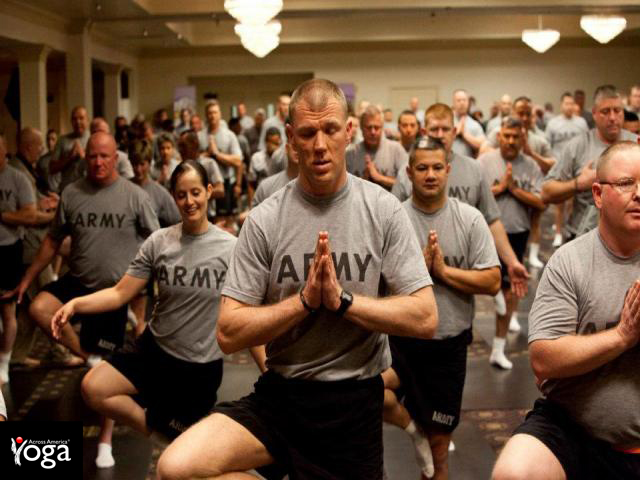
Two of the things I’m most passionate about are veteran’s issues and yoga, so you can imagine how excited I was to receive a copy of Beryl Bender Birch’s new book, Yoga for Warriors: Basic Training in Strength, Resilience, and Peace of Mind (Sounds True). I was impressed from the very first page. As much a “why” as a “how to,” the book covers a lot of the ideas that I write about on Rewire Me. For example: “The scientific community is finally confirming what yogis have known for thousands of years: the mind can heal the body and itself.” Yes!
What an inspiration Beryl Bender Birch is. She began teaching yoga in the 1970s—before it was fashionable—and is still going strong. She is the author of the best-selling Power Yoga, as well as founder and director of The Hard & The Soft Yoga Institute and the Give Back Yoga Foundation. She began working with first responders and those dealing with post-traumatic stress after 9/11, and the power of her experiences became a model, which she applied to her work with servicemen and women. It’s in this place of wisdom, service, and compassion that the book is rooted.
Although written primarily for those who serve or have served in the military and their families and loved ones, there is something in Yoga for Warriors for everyone. In the following excerpt, Beryl Bender Birch introduces readers to the ways and reasons yoga can transform us.

Rose Caiola
Inspired. Rewired.
The Peaceful Warrior
Something happens to people who practice yoga regularly. They change. They may not have planned to change, other than maybe becoming a little more flexible or healing an injury, but they do change. And not in a way they expected. In the forty-plus years I have been teaching, I have asked thousands of people with a regular practice the following question: “How many of you feel that yoga has changed your life?” Everyone always raises a hand. There has never been one person who hasn’t. Now really, that isn’t so remarkable. Everything changes all the time; you don’t need to do yoga to experience change. That’s true. But then I add, “I assume it was for the better.” They laugh and say, “Yes, for the better.”
 So here are all these people saying that yoga has changed them and that the change has improved their lives. Now that is a little unusual. It isn’t random change. As a long-time yoga practitioner, I can say with some degree of certainty that this is a different kind of a change—it isn’t exactly a conscious change because it sneaks up on you.
So here are all these people saying that yoga has changed them and that the change has improved their lives. Now that is a little unusual. It isn’t random change. As a long-time yoga practitioner, I can say with some degree of certainty that this is a different kind of a change—it isn’t exactly a conscious change because it sneaks up on you.
But it is a directed change. You take up yoga, in any of its many forms—whether the physical practice of the postures (asanas) or the breathing practices or mindfulness meditation—and then you practice regularly without a break and with some kind of personal involvement of your heart. This means you commit to it, you are earnest in your discipline to show up and just do it. You don’t have to talk about it. You don’t have to share it. You just have to do it. And lo and behold, change starts to happen. Transformation!
Getting Your Attention in Present Time
How does that change happen? Well, yoga—in all its forms and expressions—teaches you to center, to pay attention. Yoga is about focusing on one thing, and then working to keep that focus on that one thing without distraction or interruption. That’s the training. Whatever you are doing, whatever the point of focus—maybe it is the breath, maybe a prayer or word, or maybe a yoga posture—the work is about making the effort to hold the focus on that single point. When you learn to pay attention, to hold focus on the present moment, you slow down. Not in a sleepy, lazy, passive sort of way, but in an alert, clear, relaxed sort of way: heart rate, breathing, mind activity, muscle tension all slow down and relax. Your body gets a break from the tension your mind generates. You feel better. You are better. In that moment, you are creating life and longevity for yourself. You are more relaxed. And guess what: you are actually more content, and eventually, more happy.
This book is about helping you learn how to focus on one thing, which will in turn, get your attention into present time. I understand that the present moment, at times, can be hell. Why in the world would we want to be here? “Here” sucks at times.
The advantage is that as you train yourself to be present and stick with your practice come hell or high water, there is less and less room in your head for the noise about the past and the future; consequently, the stressful effects on your body are reduced. The present moment is where life is truly lived and is the only place it is truly lived. Think about it. What’s the option?
Whenever we aren’t “here,” where are we? Well, our bodies are always here. We can’t get around that. But our minds . . . oh, our minds, where are they? They can be anywhere: disconnected from our bodies and drifting around; off on their own as if they had no connection to us at all; stuck in the past or frightened of the future; reexperiencing old traumas or dreading new experiences; and causing us all kinds of havoc—anxiety, indigestion, sleeplessness, irritableness, panic attacks, and a host of other conditions and illnesses that we really don’t need to list here.
But the truth is that, even when our minds seem to be off on their own and not “here,” they really are here. All the internal dialogue that goes on when we have been injured, traumatized, insulted, ignored, or disrespected, and all the drama, the turmoil, the internal conversations, the reexperiencing, the fear of the next moment doesn’t happen out in space somewhere. It happens in the body. The body hears it, responds to it, absorbs it, and believes it. Our cells do their best to carry out their responsibilities and maintain our health and wellness, but it must get a little discouraging for them at times, when the mind is constantly in a state of distress and broadcasting negative and fearful energy. No wonder we have indigestion or can’t sleep.
Body and Mind Together
The body and mind are inextricably connected, even though a good bit of the time they seem to be in different worlds.
To heal from trauma or injury means to get our body and mind working together on the same page, supporting one another and giving each other positive reinforcement. That is what happens when we start practicing yoga. The word yoga means “union.” It refers to the link between the body and mind, and it strengthens our awareness of the impossibility for either one of them to exist independently. As a result of yoga practice, we start to notice little changes. We have moments of feeling whole. Our internal dialogue shifts just a smidgeon. The conversations we have with ourselves in our head—that dialogue that seems to go on endlessly—quiets a little bit. You know the conversations I mean: the two different players, arguing back and forth about the “right” course of action. They never stop talking! If we had a spouse or a roommate like that, what would we do? Throw them out. And yet here is that endless noise in our very own mind going on and on and on. In yoga, we are able to diffuse this a bit and quiet it down. We become a little less critical of ourselves and a little more tolerant, more supportive and gracious to ourselves. We see a light at the end of the tunnel. And that inspires us to continue our practices, as they seem to be working. We have a moment of being grateful, happy even. Maybe we can get better, improve our outlook, direct our lives the way we want them to go, and as we continue, the light gets brighter.
Adapted from Yoga for Warriors: Basic Training in Strength, Resilience, & Peace of Mind by Beryl Bender Birch. Copyright © 2014 Beryl Bender Birch. Published by Sounds True.
Click here to find out about Rose’s thoughts on wellbeing and health



1 Comment
Heidi Behr
Terrific post about this great book! Beryl Bender Birch truly has a wonderful heart for this work. Her teaching style is clear and encouraging. Her books are so helpful. As a clinician who treats clients who have PTSD, and as someone who has counseled many veterans over the years, I known this population needs yoga- they need the skills to help change their brains, to calm the alarm bells set off by intrusive memories. This excerpt perfectly details how a focused mind can be brought back to the present- for a returned soldier, or for anyone who has lived through trauma or who struggles with depression or anxiety, that is a sanity- saver.